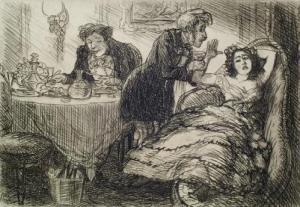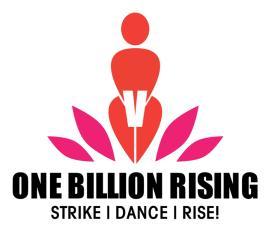This essay first appeared on Cliterati on February 24th; I have modified it slightly for time references and to fit the format of this blog.
I’ve written on numerous occasions about the way Western culture has returned in many ways to the Victorian Era; we have seen a return of that time’s extreme sexual prudishness, its affection for polysyllabic euphemisms, its dedication to prohibition of drugs and sexual activities and its “white man’s burden” colonialism, and the popular Victorian myths about the “innocence” of children (including adolescents), “white slavery” and the moral superiority of women over men have returned as powerfully as if they had not lain dormant for most of the 20th century. But while I am not alone in decrying all of these things, I have until recently felt relatively isolated in my resistance to one of the most damaging and perfidious of all Victorian revivals: the belief that rape is a “fate worse than death”.
Before we go any further, let me assure you that I know whereof I speak: I have been raped several times, and the first instance (in May of 1995) was rape by even the strictest, most unforgiving and most legalistic standard. It was a terrifying experience, but it did not destroy me and was not the worst thing ever to happen to me; in fact, it wasn’t even the worst thing to happen to me that year. Yet nearly every time someone finds out about it for the first time, he or she acts as though it happened last night, as though this one kind of trauma had the unique ability to cause permanent and irremediable damage. The dominant cultural narrative is that both men and women can get over just about any personal tragedy – financial ruin, the loss of a limb or a loved one, persecution by governmental authorities, etc – except rape, which if it doesn’t leave a woman a psychological wreck is supposed to at least cast a dark pall over the rest of her life.
 Consider for a few moments the incredible misogyny of this doctrine: first of all, it is nothing but a thinly-disguised version of the notion that all of a woman’s value, importance and identity resides in her sexual “purity”, and if that is defiled she is permanently “ruined”; the same belief also underlies the expression “selling herself” (meaning sale of sex, as if it were her entire being). It portrays women as passive, fragile creatures out of Victorian melodrama, delicate flowers completely at the mercy of a brutal universe (and therefore in need of protection by some authority outside themselves). It perpetuates the myth that sex is for women a horrible, dirty, dangerous ordeal that must be sanctified by magical rituals in order to be endured (preferably while lying on one’s back and thinking of England), and worst of all it portrays the penis as some sort of semi-divine instrument capable of destroying a helpless woman’s entire life at the whim of the man to whom it is attached. Yet it is not only religious fundamentalists who promulgate this absurd mythology, but elected officials and even feminists; it is so pervasive, in fact, that a rape victim who fails to behave according to the approved script may not be believed.
Consider for a few moments the incredible misogyny of this doctrine: first of all, it is nothing but a thinly-disguised version of the notion that all of a woman’s value, importance and identity resides in her sexual “purity”, and if that is defiled she is permanently “ruined”; the same belief also underlies the expression “selling herself” (meaning sale of sex, as if it were her entire being). It portrays women as passive, fragile creatures out of Victorian melodrama, delicate flowers completely at the mercy of a brutal universe (and therefore in need of protection by some authority outside themselves). It perpetuates the myth that sex is for women a horrible, dirty, dangerous ordeal that must be sanctified by magical rituals in order to be endured (preferably while lying on one’s back and thinking of England), and worst of all it portrays the penis as some sort of semi-divine instrument capable of destroying a helpless woman’s entire life at the whim of the man to whom it is attached. Yet it is not only religious fundamentalists who promulgate this absurd mythology, but elected officials and even feminists; it is so pervasive, in fact, that a rape victim who fails to behave according to the approved script may not be believed.
For many years, I felt as though I was one of a tiny minority of women who understood all this, but lately I’ve seen more and more writers dare to broach the subject. Last July in The New Inquiry Charlotte Shane wrote,
…Though some feminists regard “rape equals devastation” as sacred fact, the notion that a man can ruin me with his penis strikes me as the most complete expression of vintage misogyny available. Common sense instructs us that it is far more “dangerous” to insist to young women that they will be broken by an unwanted sex act than it is to propose they might have a happy, healthy, and sexually pleasant future ahead of them in spite of a sexual assault…When we refuse to acknowledge the possibility that a rape could be anything less than a tsunami of emotional and mental destruction for a woman, we establish a fantasy of absolute male sexual power and absolute female vulnerability. We are, in essence, honoring the timeless belief that a woman’s worth, self-respect, and ability to function within society are dictated exclusively by the sexual use of her body…
Then last month in The Telegraph, Katy Brand covered similar ground:
Let me start with a trio of quotes from three famous feminists…First, Camille Paglia: “Rape is an outrage…but the hysteria around rape is equally outrageous. The whole system is now designed to make you (i.e. the victim) feel you are maimed and mutilated forever.” And…Fay Weldon…“rape is not the worst thing that can ever happen to a woman, if you are safe, alive and unmarked afterwards.” And finally Germaine Greer, “it is not women who have decided that rape is so heinous but men. The only weapon that counts in rape is the penis, which is conceptualized as devastating.” Obviously none of these women were seeking to trivialise rape with their comments, they were mainly arguing against this apparent belief in society that following a rape, a woman will never, ever truly recover – that her life will be over, that she may never feel joy again nor be able to have a functioning sexual relationship for the rest of her days. And that is quite a thing to tell someone after they have been the victim of a crime. If you tell women this over and over again, we will start to believe it, and then we will start to live as if it is true…
 Brand’s article was inspired by Eve Ensler’s One Billion Rising project, which encourages people – women and men both – to dance in the street as a demonstration against rape and against the “rape is eternal” narrative. As Brand put it, “It’s defiant and powerful, both to the accepted wisdom about how rape victims might behave after what they have suffered, and also a good two fingers up at anyone who wishes to crush a woman’s life force using violence and enforced sex.” Now, I can’t say that I think One Billion Rising is effective activism, because it takes a lot more than flashy demonstrations to effect the kind of change necessary to reduce the rape rate (especially when we as a society aren’t even headed in the right direction, though that’s a discussion for another day). However, I don’t think there’s anything wrong with it, and encouraging women to “rise above” the fear of rape (and its aftereffects) is an excellent idea even if this particular project can’t accomplish it. There are a number of feminists who had much harsher words for Ensler’s creation; they seem to feel it “trivializes” rape, and most of them seemed offended by the very idea of a statement on the subject that was neither bitter nor angry nor lugubrious. One such critic even compared rape to the Holocaust, which I think any reasonable person can agree is a bit much. Hyperbole, calculated outrage and dismissal of the experiences and opinions of real women who have been there may serve to advance a political agenda, but for real rape victims they do far more harm than good.
Brand’s article was inspired by Eve Ensler’s One Billion Rising project, which encourages people – women and men both – to dance in the street as a demonstration against rape and against the “rape is eternal” narrative. As Brand put it, “It’s defiant and powerful, both to the accepted wisdom about how rape victims might behave after what they have suffered, and also a good two fingers up at anyone who wishes to crush a woman’s life force using violence and enforced sex.” Now, I can’t say that I think One Billion Rising is effective activism, because it takes a lot more than flashy demonstrations to effect the kind of change necessary to reduce the rape rate (especially when we as a society aren’t even headed in the right direction, though that’s a discussion for another day). However, I don’t think there’s anything wrong with it, and encouraging women to “rise above” the fear of rape (and its aftereffects) is an excellent idea even if this particular project can’t accomplish it. There are a number of feminists who had much harsher words for Ensler’s creation; they seem to feel it “trivializes” rape, and most of them seemed offended by the very idea of a statement on the subject that was neither bitter nor angry nor lugubrious. One such critic even compared rape to the Holocaust, which I think any reasonable person can agree is a bit much. Hyperbole, calculated outrage and dismissal of the experiences and opinions of real women who have been there may serve to advance a political agenda, but for real rape victims they do far more harm than good.
